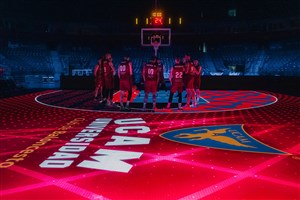
Afghanistan's national wheelchair basketball team is bigger than basketball
CHARLOTTE (Steve Goldberg's Wheel World) - While watching a segment on sledge hockey, the icy equivalent of wheelchair basketball, on the American news magazine 60 Minutes' sweatier spinoff called 60 Minutes Sports, I listened as former USA national team player Victor Calise said: "Without sport I wouldn't be where I am."
Mirwais Rahimi knows what he's talking about. The 31-year-old from Kabul, Afghanistan this week told AFP that playing wheelchair basketball had not only changed his own life but, perhaps more importantly, altered the attitudes of those around him who thought that he could never do sports because he was stuck in a wheelchair.
Rahimi is a player on the first Afghanistan national wheelchair basketball team which was in Italy last week for its first-ever international competition, where they were hosted by one of Europe's top teams, Briante84 of Cantu, near Milan.
The team is the pinnacle of a program founded in 2010 by Alberto Cairo, an Italian physiotherapist who has been working in Kabul with the International Committee of the Red Cross (ICRC) as the head of their orthopedic center there since 1989. The foundation is a league that now has over 250 male and female players.
Earlier in May, the third annual Afghanistan men's wheelchair basketball national championship tournament was held in Kabul with six teams competing from Herat, Jalalabad, Kabul, Kandahar, Maimana and Mazar.
As was the case with the women's championship that took place the previous week, it was the first time the tournament was held indoors, which was fortuitous as Kabul experienced major rain storms each afternoon of the tournament. These would have made it impossible to play on the old outdoor court. Kabul won its first title over Maimana in the final.
The Italian tournament was not just their first international competition but for most all of them, a first in every sense of the word. First time out of their country; first time on a plane; first time not eating Afghani food; the first time at a beach and so on. Just as exciting, their first win over the team from Cinisello by one point on a pair of free-throws with 45 seconds to play to give the Afghans their historic victory.
The win was welcomed but these players and their compatriots on their local teams back home were already winners.
Rahimi, a paraplegic since he was injured by shrapnel 20 years ago while he was working in a shop, the collateral damage of warring mujahedeen, went on to explain further to AFP the difference that playing ball has made.
"In the past I was so depressed,” said Rahimi. "I thought a disabled person cannot do anything else.
"After I started wheelchair basketball, my mind changed, my spirit changed... I have a lot of friends. We talk together, we talk about our problems. Now we are so happy, we don't think we are disabled."
The team is coached by an American, Jess Markt, who was a high jumper at the University of Oregon before an automobile accident at age 19 changed his life. He had moved to New York and was playing for the New York Rolling Knicks when he got the offer from the International Red Cross to coach in Afghanistan. It started with traveling to towns throughout the country to start teaching wheelchair basketball skills and evolved into national team coach.
Markt told AFP that beyond the language barrier, the biggest challenge for him when he started working in Afghanistan was coaching people who had never played sports before.
"They all grew up in a country where, as disabled people, sports were not an option. Participatory sports are not very big in Afghanistan anyway," he said.
There was a mindset he had to change as well.
"A disabled person in Afghanistan for the most part, through no malice, is very marginalized," said Markt. "They are normally expected to stay at home; food is brought to them; nothing is expected of them.
"Since we started this program, many of these guys have gone out and gotten jobs, started small businesses of their own. Every player to a man, or a woman, is a completely different person in terms of their confidence.
Cairo put it to the BBC this way: "They felt that they were nobody and now through sport they have achieved something, they have represented their country."
Markt, who has also traveled to Cambodia on behalf of the ICRC to promote wheelchair basketball, has documented the ascent of Afghani wheelchair basketball in a must-read blog called the Afghanistan Wheelchair Basketball Project.
There is also a documentary in progress called The League of Afghanistan and you can see a preview of it here.
With the strength of teams in their region, it is unlikely that Afghanistan will make the Paralympic Games or World Championships anytime soon. But unlikely is not impossible. As the game continues to grow there, the next generation of players may surprise us all.
Calise, who I quoted at the beginning of this column, can attest to that. Now the commissioner of the New York City Mayor's Office for People with Disabilities, he was on the ice for the USA national sledge hockey team at the Nagano Winter Paralympic Games in 1998 where the Americans finished next to last in their first major tournament. Two years later at the world championships, they were last.
But another two years later at the Salt Lake Paralympics, they won gold.
Markt is optimistic about his team, telling AFP: "Having seen how well they've performed over the last couple of years and out here in their first international competition, I would never count them out."
Steve Goldberg
FIBA
FIBA's columnists write on a wide range of topics relating to basketball that are of interest to them. The opinions they express are their own and in no way reflect those of FIBA.
FIBA takes no responsibility and gives no guarantees, warranties or representations, implied or otherwise, for the content or accuracy of the content and opinion expressed in the above article.
To help make this column as inclusive as possible, please send any national or international event information, story suggestions, or comments to wheelworldmail@gmail.com.

















